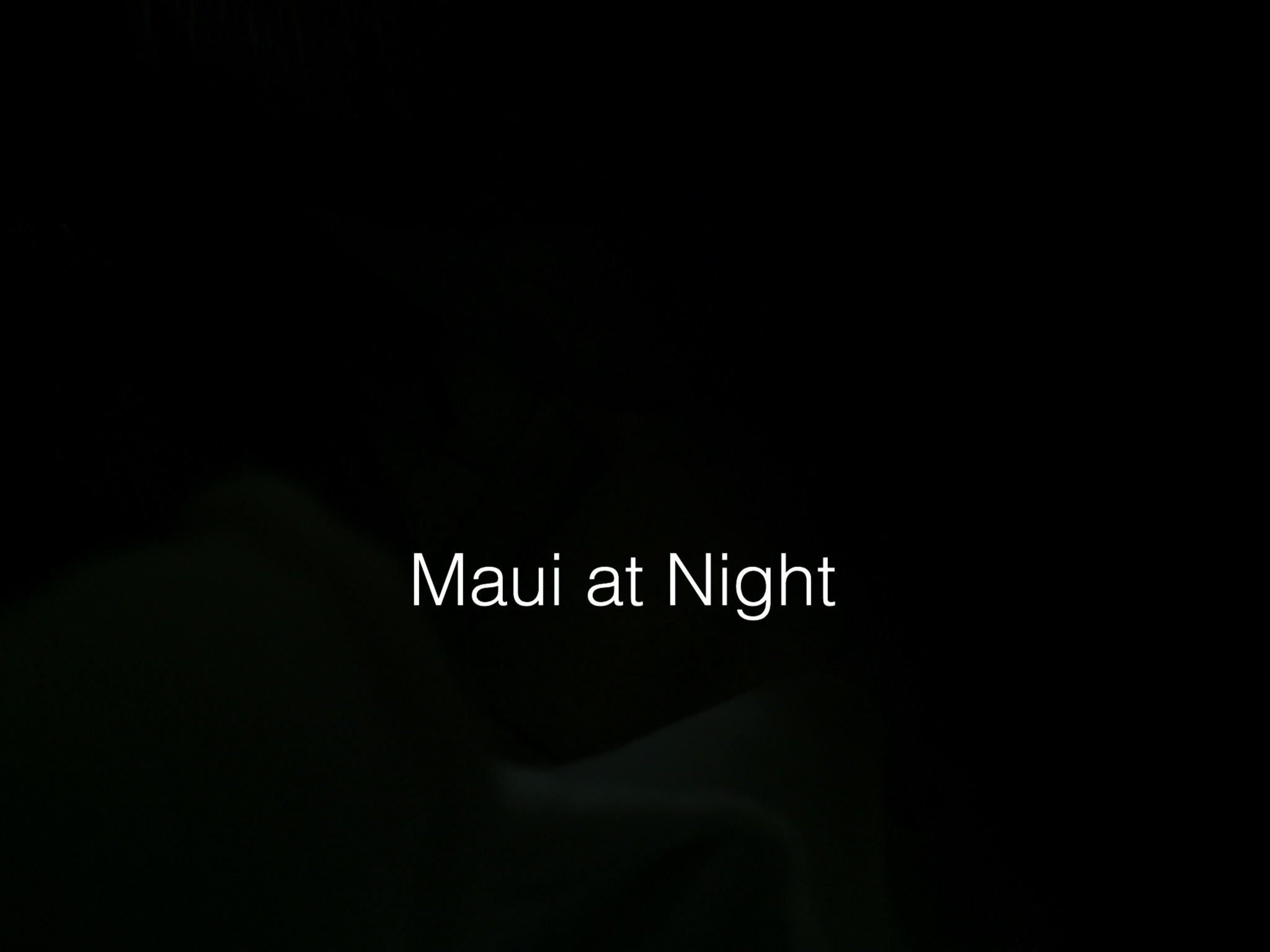Embrace the Night
When I was first a tourist on Maui, I used to enjoy sending postcards to my friends. Rather than sending the usual colorful images of turtles, whales and waterfalls, I had fun sending a card that was all shiny and black. On the bottom it said: “Maui at Night.” Maui or Montreal, it’s all the same at night.
 Now I’m alone in my Haiku home discovering that Maui at night is not always shiny and black. I’ve just woken up yet another time needing to go to the bathroom. It’s 2:30am. A full moon is lighting up the landscape outside the big slider as if it were daylight. I can see up the gulch to a hill where the moon is brushing the tree tops. Off in the distance is Mount Haleakala, standing like a sentinel, over 10,000 feet high. Fresh scented breezes drift in through the window, cooling the room. The silence of the night is so profound that I can hear it ringing in my ears. A gecko chirps somewhere in the house. I’m alone in my own private sanctuary. I love it.
Now I’m alone in my Haiku home discovering that Maui at night is not always shiny and black. I’ve just woken up yet another time needing to go to the bathroom. It’s 2:30am. A full moon is lighting up the landscape outside the big slider as if it were daylight. I can see up the gulch to a hill where the moon is brushing the tree tops. Off in the distance is Mount Haleakala, standing like a sentinel, over 10,000 feet high. Fresh scented breezes drift in through the window, cooling the room. The silence of the night is so profound that I can hear it ringing in my ears. A gecko chirps somewhere in the house. I’m alone in my own private sanctuary. I love it.
 I spend half the week in Haiku, and the other half with my partner Susan on the south side of the island. The south side, which includes Kihei and Wailea, has hotels, condos, bright lights and traffic. It also has one of the most beautiful beaches in the world just one hundred yards from where I’m sleeping. From our second floor bedroom I can hear the surf crashing on the beach. Tonight it’s a low rumble; at other times it’s loud and menacing. The moon is sparkling on the ocean, like some paradisiacal scene from that great classic movie, South Pacific.
I spend half the week in Haiku, and the other half with my partner Susan on the south side of the island. The south side, which includes Kihei and Wailea, has hotels, condos, bright lights and traffic. It also has one of the most beautiful beaches in the world just one hundred yards from where I’m sleeping. From our second floor bedroom I can hear the surf crashing on the beach. Tonight it’s a low rumble; at other times it’s loud and menacing. The moon is sparkling on the ocean, like some paradisiacal scene from that great classic movie, South Pacific.
I enjoy the contrast between my solitary nights and my “family” nights with Susan and our dog Kamalani. When I’m with Susan, and wake up in the middle of the night, she’ll often reach out her hand and touch mine, sleepily saying, “I love you.” “I love you too,” I whisper back. What could be more tender and life affirming than two hands touching in the dark?

Getting out of bed, I see my dog Kamalani, an Australian Shepherd, lying on his back next to the bed. His tummy is showing and his legs are in the air, a pose of total surrender. He gives a groan of pleasure as I kneel down and give his tummy a rub. These are the times when I like my nights.
I remember when nights were a time of getting deep rest, of waking up in the morning feeling refreshed. Not so any more. It may be my over active bladder; it may be the five months of radiation I had to my pelvic area after my prostate cancer came back. Who knows? What I know now is that I have to get up five or more times each night to go to the bathroom. It’s a little like Groundhog Day. Five times I get to experience what Edgar Allan Poe describes as, “Those little slices of death.” I’ve come to accept that this is part of having an aging body, and please don’t tell me about all the ways I can cure this problem. I’ve tried (and am still trying) them all.
As I go back to bed for another 90 minutes of sleep, I often think of some of the unusual nights I’ve spent in a lifetime of nights. So many nights. If I’m not mistaken, some 27,983 of them.
They randomly pop to mind: a night spent on a train in China in 1979, with Paul Horn playing his flute for the Chinese as we sped through the darkened countryside. My then wife Fran and I were making a film on him called Paul Horn in China.

Another night trying to sleep in a freezing snowdrift somewhere in the Northeast, nearly freezing to death; drunken nights as a teenager, getting home as the sun came up in Montreal, where I grew up; a night at a party given by a wealthy gay man in Paris who owned a boa constrictor; endless nights lying in bed with my first wife Fran in our home on Kauai, as she slowly died of cancer, not sure if the next breath would be her last; another night, staying up for 24 hours with other members of my spiritual community, so that we could rekindle our love for Guru and God. 
And when I lived on a farm with my second wife Linda, nights of going out in sleet and rain to search for newborn baby lambs, and bringing them in to the barn, where I would help them nurse on their mother’s teat for the first time.
So many nights overshadowed by death: my first night alone the day I found out my mother had died. I had just turned twelve. And memories of life: staying up all night in a Toronto hospital, in the days when husbands weren’t allowed in the delivery room, waiting for Fran to give birth to my son Peter.
So many nights. With all my journaling and obsessive record keeping, I can account for almost every daytime hour of the 27,983 days, but not the nights. I’m not a night person. I don’t like the night. I don’t like staying up late at night. I don’t like going out at night. I don’t like driving at night. I don’t like flying at night. I don’t like seeing the world dark. On New Year’s Eve, I make it a practice to go to bed even earlier than I do most nights.
I’ve tried to become friends with the night. But, like someone you try to like, and just can’t, I’ve been unsuccessful. Is it some deep fear of confronting the darkness? Is it a fear of death? Is it a fear of embracing the shadow side? I don’t think so. I’ve confronted the dark; I’ve had a close look at death; I’ve spent years exploring my “shadow side” in therapy. I’m just not a night person.
Many people thrive in the night. They party, they play, they watch TV, they get into fights, they make love, and sometimes, in the big cities, they kill each other. Nighttime has always had a connotation of death. Nighttime is the shadow time, the time of vampires and demons.
Nothing expresses the mystery of the night more beautifully than the lyrics from Phantom of the Opera:
Slowly, gently night unfurls its splendor
Grasp it, sense it, tremulous and tender
Turn your face away from the garish light of day
Turn your thoughts away from cold unfeeling light
And listen to the music of the night.
 Not everyone uses the night to party and play. Some use it to go deep within themselves. Tenzin Palmo, a Buddhist monk, lived in a cave in a remote area of the Himalayas for twelve years, attempting to be the first Buddhist nun to achieve enlightenment. In her book Cave in the Snow, she describes how she slept in a 3-foot box for just a few hours each night; definitely not my style. I complain if I have to sleep in anything smaller than a king-size bed.
Not everyone uses the night to party and play. Some use it to go deep within themselves. Tenzin Palmo, a Buddhist monk, lived in a cave in a remote area of the Himalayas for twelve years, attempting to be the first Buddhist nun to achieve enlightenment. In her book Cave in the Snow, she describes how she slept in a 3-foot box for just a few hours each night; definitely not my style. I complain if I have to sleep in anything smaller than a king-size bed.
My friend Corina is currently doing a ten-day “Darkroom Retreat” in Indonesia with a teacher named Jasmuheen. The participants are given no food and just a little water. They learn to draw on prana as an alternate source of food. Is sitting in a dark room for ten days what I need to become friends with the night? Maybe if they offered chilled Chardonnay instead of water.
I think there are easier ways of embracing the darkness. Light and darkness are both a manifestation of the one energy. These days I’m trying not to resist the darkness, nor to be attached to the light. The more I allow everything to be as it is, the happier I’ll be.

